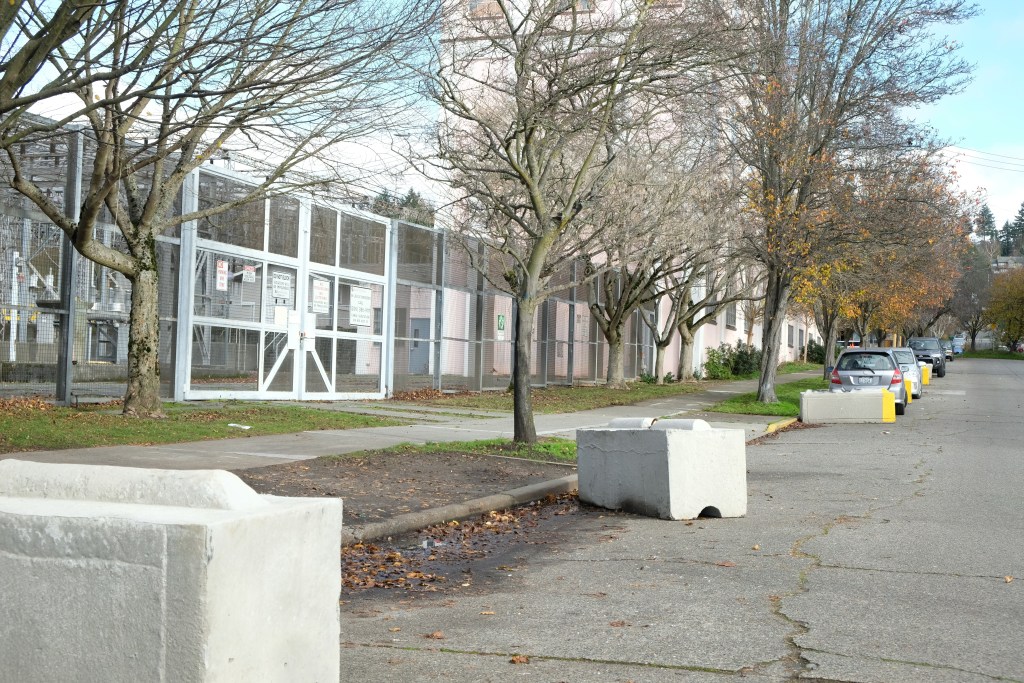
Fremont Brewing Is Still Using Concrete Blocks to Prevent RV Parking. So Are the City of Seattle and the US Postal Service.

By Erica C. Barnett
After at least one formal complaint, the Seattle Department of Transportation has issued a warning—but no penalty—to Fremont Brewing, the company co-owned by city council member-elect Sara Nelson, for obstructing the public right-of-way around its Ballard brewing facility with massive concrete “ecology blocks.”
As PubliCola reported last summer, eco blocks—so called because they are a byproduct of concrete production that uses waste that would otherwise occupy landfills—are an inexpensive way for business owners to prevent people living in their vehicles from parking on the street next to their properties.
Since the beginning of the pandemic, when the city stopped enforcing a law requiring people to move their vehicles every three days, the blocks have proliferated throughout Seattle’s industrial areas, which are the only places where people living in oversized vehicles can legally park. Business owners say that the presence of RVs and other types of large vehicles, such as box trucks, discourages patrons, and that large concentrations of RVs can lead to health and safety problems that impact their customers and employees.
Obstructing public streets is illegal, but SDOT has treated eco-blocks differently than other street obstructions; instead of penalizing business owners for taking over public space that belongs to everyone, as they might if a random person set up a tire fort or craft fair in the middle of the street, the department has responded to the proliferation of eco-blocks by essentially throwing up its hands.

This is true not just of Fremont Brewing, which received a written warning, but of many other businesses around the city’s industrial areas as well as the US Postal Service, which surrounded its Ballard sorting facility with eco blocks way back in August 2020.
At the time, USPS spokesman Ernie Swanson told PubliCola that “USPS got the OK from the city to put in the concrete barriers” in response to a proliferation of RVs in the area. The Seattle Department of Transportation disputed this, calling the road-blocking barricades “unpermitted,” but took no action. They’re still there today, graffiti-covered and looking dingy compared to their more recently installed counterparts in front of a Bevmo!-anchored strip mall across the street.
Contacted for information about why the blocks are still in place more than a year later, Swanson said, “The concrete blocks were placed in front of the Ballard PO as well as other neighboring businesses as a response to a proliferation of needles, human waste and other hazardous materials being discarded on the property. As of this date, the blocks remain not only in front of the PO but also other businesses in the area. We have no knowledge that a permit was ever required.”

The city’s process for dealing with Fremont Brewing’s ecology blocks was typical. After someone filed an anonymous complaint about the blocks in September, SDOT performed an inspection “and observed ecology blocks” in the street around Fremont Brewing, according to a notice SDOT sent to the company September 17. “We do not allow this type of use in public right-of-way due to traffic safety concerns as well as transportation and utility access needs. Please remove these unpermitted encroachments from public right-of-way by the compliance date indicated below”—November 10.
November 10 came and went; the blocks remained. About a week later, the case was closed.
SDOT spokesman Ethan Bergerson told PubliCola the department followed “standard procedure” in responding to the complaint. “The first step in the enforcement process is to mail a letter to the adjacent businesses or property owners notifying them of their responsibilities to remove the concrete blocks,” Bergerson said. “The purpose of this letter is to initiate a conversation with the responsible party so that we can find a path forward leading to their removal of the unpermitted concrete blocks. To date, we have sent letters of this nature to property owners and businesses adjacent to concrete blocks left in about a dozen locations around Ballard, SoDo, and Georgetown. … Our approach [with Fremont Brewing] has been consistent with the other locations.”

Fremont Brewing owner (and Nelson’s husband) Matt Lincecum, who runs the company day to day, declined to comment for this story, as did Nelson.
SDOT has the authority to take enforcement action against any business (or government entity) that obstructs the public street with eco blocks or other objects that make it impossible for the public to access streets, sidewalks, or parking strips. To date, it has not done so, beyond warnings like the one it issued to Fremont Brewing.
As if to emphasize the city’s lackadaisical approach to enforcement, Seattle City Light has installed its own anti-RV fortifications at its Canal Substation, located two blocks away from Fremont Brewing and the rest of the eco-block-littered Ballard brewery district. In addition to eco-blocks in the street, the north side of the substation is walled off by two layers of fencing that completely obstruct the public sidewalk. A review of historical Google Maps reveals that the eco-blocks were installed sometime after this past August, when several RVs were parked along the south side of the substation. The fence, too, is new; as of June 2021, per Google Maps, several RVs were parked on that side of the substation, too. Since then, the RVs appear to have moved around the corner, to a narrower residential street on the east side of the building.
We’ve reached out to City Light as well as SDOT about the obstructions around the Canal Substation and will update this post when we hear back.

From the point of view of a property owner, ecology blocks solve an immediate problem—people living in RVs or parking large vehicles indefinitely in front of their business—that the city has failed to address. But the fact remains that even if the city continues to turn a blind eye to vigilante street obstructions, nothing will really change until the region stops ignoring the needs of people living in vehicles, who make up as much as half of King County’s homeless population. In the absence of “safe lots,” social services, and affordable, permanent housing, people sleeping in their vehicles will continue to take up space in public,
But no amount of semi-sanctioned street and sidewalk obstruction will fix the underlying problem: The city and county have dedicated virtually no resources to people living in vehicles, who make up as much as half of the region’s unsheltered homeless population.
